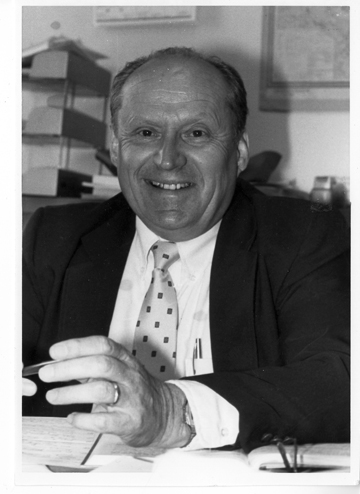 Pete Silins was tough, and I mean that as a compliment. He had to be tough to survive what he saw as a boy during World War II, when Stalin and Hitler trampled murderously over his country, Latvia. At the war’s end, racked by hunger in a European refugee camp, Pete one day watched a U.S. G.I. toss a half-eaten sandwich out of a jeep and into the dirt a few feet away. Pete was too proud to pick it up and eat it.
Pete Silins was tough, and I mean that as a compliment. He had to be tough to survive what he saw as a boy during World War II, when Stalin and Hitler trampled murderously over his country, Latvia. At the war’s end, racked by hunger in a European refugee camp, Pete one day watched a U.S. G.I. toss a half-eaten sandwich out of a jeep and into the dirt a few feet away. Pete was too proud to pick it up and eat it.
I recalled that story when I heard about Pete’s death. He had shared it during one of our Russian tutorials in the early 1980s. I knew back then that I wanted to be a foreign correspondent; and with the Cold War still raging, my career goal was to someday be "our man in Moscow," as Pete often called me as a way of encouraging me. I never did go to Moscow; I chose instead to become our man in Mexico. But the things I learned from Pete in the Russian and Russian history courses I had with him—about language, about foreign and especially authoritarian societies—stayed with me. One of them was that you have to be tough: Pete often reminded me that navigating places like Eastern Europe or Latin America can be as arduous as memorizing Russian noun cases, but that the payoff for digging in can be as satisfying as learning an elegant line from Tolstoy.
Pete was chiefly a German professor at Wabash. But I got to know him perhaps better than most students because I was one of the few who wanted to learn Russian. Some semesters I was the only one, which meant Pete and I usually met in his office on the second floor of Yandes (now Detchon) Hall, where he often sat in an easy chair and listened to me translate Pravda articles that he’d dug up for me. Sometimes when I blundered he would stop me and say, "Kak vam nye stidyet (You should be ashamed). Thank God you want to be a journalist, because that slip-up could get you killed if you were going to be a spy." But he always said these things with a large, knowing smile and a laugh. And I laughed, too: it didn’t take long to realize that Pete wasn’t indulging in the hard-handedness he’d grown up with under fascists and communists—he was mocking it.
Even if those tutorials were hard, I could forget about it when Pete and his wife Regina, one of the sweetest women I ever met, invited me to their home for Latvian dinners. There was a warmth to those evenings, especially the winter nights that evoked scenes from Dr. Zhivago, which we enhanced with after-dinner vodkas. It was the kind of generous and relaxingly cerebral hospitality I enjoyed so much of at Wabash. But it also showed Pete in a light I like to remember—relishing the life he’d found in America, one that didn’t require the tense toughness he’d had to summon each day as a boy. As the Iron Curtain fell in 1989, a colleague at Newsweek (the magazine I worked for then) was looking for comments from experts and asked me if I could recommend anyone. I thought immediately of Pete and was delighted to see him quoted: "I think it can’t be stopped," he said of the Soviet bloc’s sudden collapse. "People have breathed too much fresh air to be subdued." Our man in Crawfordsville.
One of my last academic moments with Pete was my oral comprehensive exam. By then we were friends; but he challenged me (through the fog of sweat I recall questions like, "Please describe for us with a few examples the inversion of Russian power structures after the Revolution") because he knew that anything less would be an insult to all the work we’d done together. It would have been like throwing a half-eaten sandwich at my feet—and he always expected his students to be proud enough to reject that sort of thing.
Da svedanya, Pete. And sbaseeba—thank you.